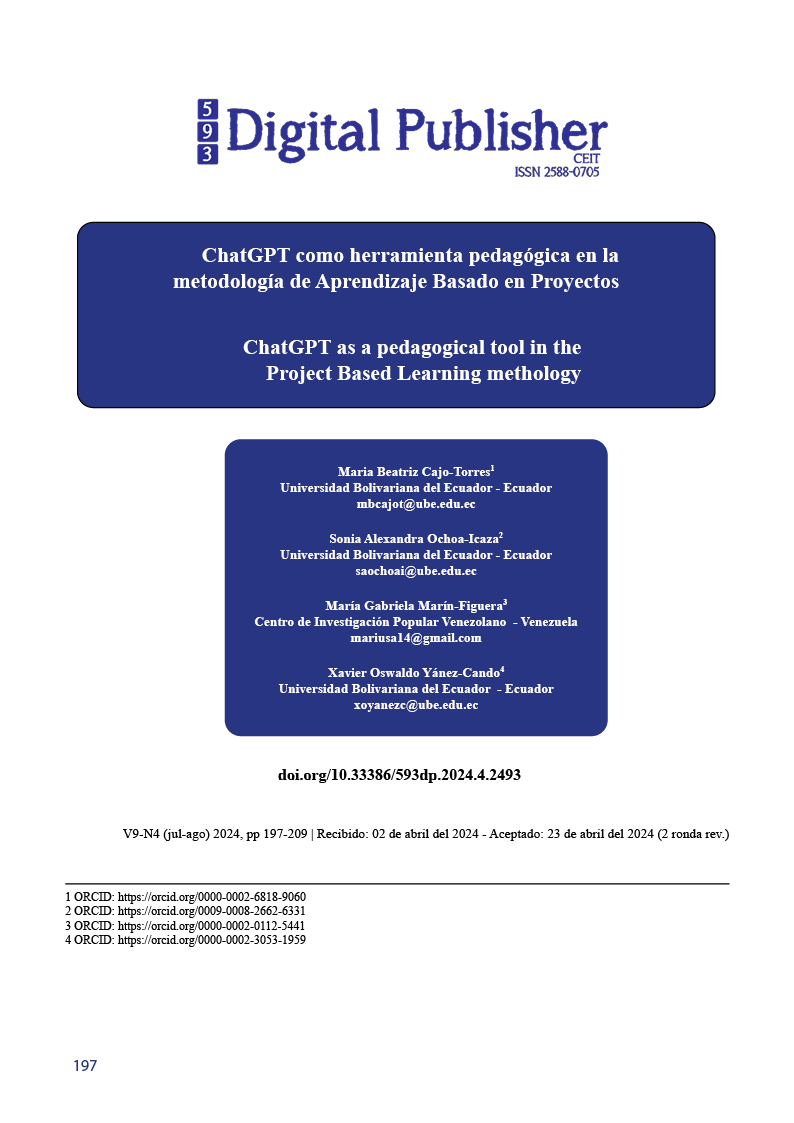ChatGPT as a pedagogical tool in the Project Based Learning methology
Main Article Content
Abstract
The emergence of artificial intelligence is an opportunity to improve learning processes, especially in a world where information is increasing every day, and tools are required that favor its processing and pedagogical use. Consequently, the objective of this research is to analyze the incidence of the use of ChatGPT as a pedagogical tool through the Project Based Learning methodology. The study was carried out based on a quasi-experimental research design, which evaluated the performance of a learning activity of the subject of Entrepreneurship and Management, for which two groups were formed, one of which was an experiment that used ChatGPT for the development of the activity, and another control, which carried out the activity in a traditional way without the use of technology. The sample was non-probabilistic of a conventional type, corresponding to 80 tertiary high school students. According to the results obtained, the effectiveness of the use of ChatGPT as a pedagogical tool in the context of Project Based Learning is significantly visualized. The experiment group, which used ChatGPT for the development of the learning activity in the Entrepreneurship and Management subject, exhibited noticeably higher performance in each of the indicators studied compared to the control group, concluding that the use of technology provides valuable perspectives to improve teaching strategies in the field of Entrepreneurship and Management.
Downloads
Article Details

This work is licensed under a Creative Commons Attribution-NonCommercial-ShareAlike 4.0 International License.
1. Derechos de autor
Las obras que se publican en 593 Digital Publisher CEIT están sujetas a los siguientes términos:
1.1. 593 Digital Publisher CEIT, conserva los derechos patrimoniales (copyright) de las obras publicadas, favorece y permite la reutilización de las mismas bajo la licencia Licencia Creative Commons 4.0 de Reconocimiento-NoComercial-CompartirIgual 4.0, por lo cual se pueden copiar, usar, difundir, transmitir y exponer públicamente, siempre que:
1.1.a. Se cite la autoría y fuente original de su publicación (revista, editorial, URL).
1.1.b. No se usen para fines comerciales u onerosos.
1.1.c. Se mencione la existencia y especificaciones de esta licencia de uso.
References
Arellano, F., Pérez, D., Gruezo, C., y Pérez, N. (2021). Aprendizaje B-learning como enfoque mezclado no agitado con las teorías del aprendizaje. Revista Científica UISRAEL, 8(1e), 93–107. https://doi.org/10.35290/rcui.v8n1e.2021.501
Arteaga-Flores, R., Mero-Mero, R., Palacios-Briones, N., y Cruz-Mera, R. (2021). La Virtualidad y su Impacto en Proceso Educativo ante El Covid-19 en Ecuador. Revista Científica FIPCAEC (Fomento De La investigación Y publicación científico-técnica multidisciplinaria). Polo De Capacitación, Investigación Y Publicación (POCAIP), 6(4). https://www.fipcaec.com/index.php/fipcaec/article/view/484
Baidoo-Anu, D., y Owusu, L. (2023). Education in the Era of Generative Artificial Intelligence (AI): Understanding the potential benefits of ChatGPT in promoting teaching and learning. Social Science Research Network. https://doi.org/10.2139/ssrn.4337484
Barrera, F., Venegas, J., y Ibalache, L. (2022). El efecto del aprendizaje basado en proyectos en el rendimiento académico de los estudiantes. Revista de Estudios y Experiencias en Educación, 21(46), 277-291. https://doi.org/10.21703/0718-5162.v21.n46.2022.015
Carcaño, E. (2021). Herramientas digitales para el desarrollo de aprendizajes. Revista Vinculando. https://vinculando.org/educacion/herramientas-digitales-para-el-desarrollo-de-aprendizaje.html
De-Vicente-Yagüe-Jara, M., López, O., Navarro-Navarro, V., y Cuéllar-Santiago, F. (2023). Writing, Creativity, and Artificial Intelligence. ChatGPT in the university context. Comunicar, 31(77). https://doi.org/10.3916/c77-2023-04
Díaz, J., Peña, D., Fabara, Z., Ruiz, A., y Macías, D. (2023). Estudio comparativo experimental del uso de ChatGPT y su influencia en el aprendizaje de los estudiantes de la carrera Tecnologías de la Información de la Universidad de Guayaquil. Revista Universidad de Guayaquil, 137(2), 51-63. https://doi.org/10.53591/rug.v137i2.2107
Chicaiza, R., Camacho, L., Ghose, G., Castro, I., y Gallo, V. (2023). Aplicaciones de chat GPT como inteligencia artificial para el aprendizaje de idioma inglés: avances, desafíos y perspectivas futuras. LATAM Revista Latinoamericana de Ciencias Sociales y Humanidades, 4(2). https://doi.org/10.56712/latam.v4i2.781
García, J., y Pérez, J. (2018). Aprendizaje basado en proyectos: método para el diseño de actividades. Tecnología, Ciencia y Educación, 37-63. https://doi.org/10.51302/tce.2018.194
García, V., Villaverde, V., Benito, V., y Muñoz, R. (2020). Aprendizaje basado en proyectos y estrategias de evaluación formativas: percepción de los estudiantes universitarios. Revista Iberoamericana de Evaluación Educativa, 13(1), 93. https://doi.org/10.15366/riee2020.13.1.004
Gutiérrez-Aguilar, O., Delgado-Delgado, F., Meza-Málaga, J., y Turpo-Gebera, O. (2023). Predictores del desempeño académico mediante el uso del ChatGPT en estudiantes universitarios. Human review, 21(2), 411-421. https://doi.org/10.37467/revhuman.v21.5077
Hilario, G. (2021). Aprendizaje basado en proyectos mediados por TIC para desarrollar competencias matemáticas en estudiantes de secundaria. Ciencia latina, 5(4), 5617-5646. https://doi.org/10.37811/cl_rcm.v5i4.7117
Lopez, C. (2023). La utilización de la inteligencia artificial chat - gpt para la identificación y evaluación de riesgos, realizada en el marco de una auditoría a los estados financieros de dos empresas que cotizan en el mercado público de valores de Colombia [Tesis de grado, Universidad Autonoma de Bucaramanga]. Repositorio Unab. https://repository.unab.edu.co/bitstream/handle/20.500.12749/20114/2023_Tesis_Ciro_Eduardo_Lopez.pdf?sequence=1
(Ministerio de Educación del Ecuador, 2015, p. 8). Guia-de-implementacion-del-Curriculo-de-Emprendimiento-y-Gestion-BGU.pdf (educacion.gob.ec)
Martínez-Pérez , M. (2020). Herramientas digitales para la enseñanza del idioma inglés. Con-Ciencia Boletín Científico De La Escuela Preparatoria No. 3, 7(14), 28-32. Recuperado a partir de https://repository.uaeh.edu.mx/revistas/index.php/prepa3/article/view/6112
Montoya, L., Parra, M., Lescay, M., Cabello, O., y Coloma, G. (2019). Teorías pedagógicas que sustentan el aprendizaje con el uso de las tecnologías de la información y las comunicaciones. Revista Información Científica, 98(2), 241-255. http://scielo.sld.cu/pdf/ric/v98n2/1028-9933-ric-98-02-241.pdf
Nieto-Borbor, C., y Martínez-Suárez, P. (2021). Caracterización del aprendizaje basado en proyectos para el fortalecimiento de competencias emprendedoras. Polo del Conocimiento: Revista científico - profesional, 6(3), 2482-2499. https://doi.org/10.23857/pc.v6i3.2526
Ogosi, J. (2021). Chatbot del proceso de aprendizaje universitario: Una revisión sistemática. lpha Centauri, 2(2), 29-43: https://www.researchgate.net/publication/372515895_desarrollo_de_chatbots_con_la_aplicacion_chatgpt_una_revision_bibliografica
Opara, O., Mfon-Ette, A., y Tolorunleke, C. (2023). ChatGPT for Teaching, Learning and Research: Prospects and Challenges. Global academic journal of humanities and social sciences, 5(02), 33-40. https://doi.org/10.36348/gajhss.2023.v05i02.001
Ramos-Galarza, C. (2021). Editorial: Diseños de investigación experimental. CienciAmérica, 10(1), 1-7. https://doi.org/10.33210/ca.v10i1.356
Romero-Rodríguez, P. (2023). La incorporación del ChatGPT en la educación superior: una mirada desde el paradigma de la complejidad. 593 Digital Publisher CEIT, 8(5), 213-225. https://doi.org/10.33386/593dp.2023.5.1976
Sudjimat, D., Nyoto, A., y Romlie, M. (2021). Implementation of Project-Based Learning Model and Workforce Character Development for the 21st Century in Vocational High School. International Journal of Instruction, 14(1), 181-198. https://doi.org/10.29333/iji.2021.14111a
Toasa, L., y Toasa, R. (2022). El proceso de aprendizaje virtual y su incidencia en la salud mental de los estudiantes. Revista Científica UIsrael, 9(1), 49-68. https://doi.org/10.35290/rcui.v9n1.2022.496
Tuárez, M., y Loor, I. (2021). Herramientas digitales para la enseñanza creativa de química en el aprendizaje significativo de los estudiantes. Dominio de las Ciencias, 7(6), 1048-1063. https://doi.org/10.23857/dc.v7i6.2380
Velezmoro, G., y Carcausto, W. (2020). Herramientas digitales en la educación universitaria latinoamericana: una revisión bibliográfica. Revista educación Las Américas, 10(2), 254-264. https://doi.org/10.35811/rea.v10i2.123
Wang, Y., y Petrina, S. (2013). Using Learning Analytics to Understand the Design of an Intelligent Language Tutor. International Journal of Advanced Computer Science & Applications 4(11), 124-131. https://doi.org/10.14569/IJACSA.2013.041117
Zhai, X. (2022). ChatGPT User Experience: Implications for Education. Social Science Research Network. https://doi.org/10.2139/ssrn.4312418





